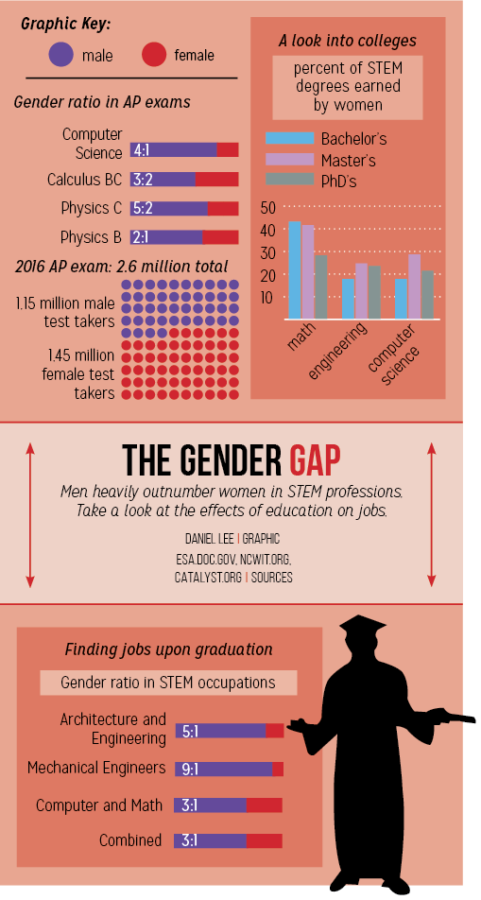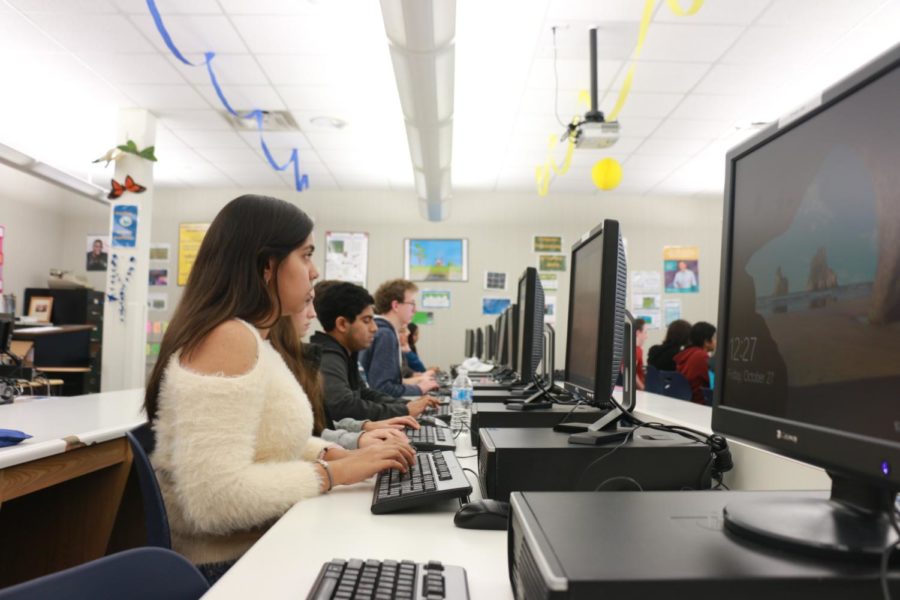Computer Science Awareness Week, from Dec. 4 to 10, is a yearly event which serves to foster the growth of computer science and encourage STEM participation. In accordance with this philosophy, the College Board debuted a new AP Course, namely AP Computer Science Principles (AP CSP), in 2016 to expand the outreach of coding to people of various backgrounds.
Ria Jain, former AP CSP student and junior, said she never had true exposure to the foundations of computer science prior to the introduction of this course. In addition, she said she is glad College Board launched this course and said she feels it was largely successful in achieving its goal during its debut year.
“From what I see, computer science is where a lot of things are in today’s technology world, and that’s also where a lot of the jobs are coming from. It’s also seen as a skill that’s being sought after because of how many things are being controlled by technology,” Jain said.
According to recent statistics released by the College Board in 2016, AP CSP has played an instrumental role in attracting underrepresented minorities and female students to engage in computer science. For example, African-American student participation in this course was 16 percent, while only 4 percent participated in AP Computer Science A (AP CSA), a much more rigorous course that expects students to have prior coding experience. Similarly, female participation in AP CSP was 28 percent, compared to 22 percent students taking AP CSA.
“I do realize that a lot of the classes related to STEM that I’m taking right now are very male-dominated,” Jain said. “I took a web design class alongside AP CSP, and I was one of maybe four or so girls. Even in AP CSP, I was probably one of a small amount of girls. It’s still pretty male-dominated, but I’m still thinking that the more girls start to believe that it’s okay to go into a guy-dominated field, especially with the introduction of this new course, it’s going to gradually start leveling up the playing field.”
Akio Fujita, former AP CSP student and junior, said he agreed with Jain’s view.

“I heard that the class was gaining in popularity, and I was also interested in how computers and the internet works, two aspects that the class focuses on. By combining the logical and creativity co
mponents, the class brings people from both sides of the spectrum, and this is why I think AP CSP is helping to close gender gap and increase minority interests,” Fujita said.
According to the AP CSP course and exam description, the course focuses on not only the coding aspects of computer science but also a variety of other topics and skills such as understanding how the Internet works, analyzing data, developing computational-thinking skills and building algorithms. In addition to a traditional paper-and-pencil exam, AP CSP is unique because students are required to submit two performance tasks that apply the information learned in the classroom as a part of their AP exam.
AP CSP teacher Theresa Kane said she believes the class is different because it covers such a broad range of computer science topics.
“I think it is more accessible to all students. Traditionally, more male students take certain computer science classes, but that is changing with the addition of this course,” Kane said.
Jain said she agreed with the fact that the course provided a more general introduction to coding that is not as hardcore as other classes such as AP CSA. Moreover, she said the course is a great option for students to see if they really are interested in computer science and provides the foundation necessary for more challenging classes.
“I think the fusion of logic and creativity components in computer science appeals to many people with varieties of interests. Other AP classes are usually either more logical-based or creativity-based,” Fujita said.
Looking into the future, Kane said she hopes College Board will add more courses similar to AP CSP. She said she would like the College Board to introduce an applications development AP class in order to have students use current platforms, mobile and others, to develop apps for the school and the community.
Jain said, “I do think that College Board should include more courses, but I’m not quite sure about the types of courses. It really depends on what students want to learn more about, and by creating such courses like AP Computer Science Principles with wider appeal, it can help to alleviate existing gender and racial gaps. They should use their best judgement and what they feel the population would like to see.”
“I do believe that College Board should implement courses that appeal to (a) wider variety of people,” Fujita said. “This will give more people around the nation, as well as the world, a chance to grow and pursue their interests in a more advanced environment.”

































![What happened to theater etiquette? [opinion]](https://hilite.org/wp-content/uploads/2025/04/Entertainment-Perspective-Cover-1200x471.jpg)













































![Review: “The Immortal Soul Salvage Yard:” A criminally underrated poetry collection [MUSE]](https://hilite.org/wp-content/uploads/2025/03/71cju6TvqmL._AC_UF10001000_QL80_.jpg)
![Review: "Dog Man" is Unapologetically Chaotic [MUSE]](https://hilite.org/wp-content/uploads/2025/03/dogman-1200x700.jpg)
![Review: "Ne Zha 2": The WeChat family reunion I didn’t know I needed [MUSE]](https://hilite.org/wp-content/uploads/2025/03/unnamed-4.png)
![Review in Print: Maripaz Villar brings a delightfully unique style to the world of WEBTOON [MUSE]](https://hilite.org/wp-content/uploads/2023/12/maripazcover-1200x960.jpg)
![Review: “The Sword of Kaigen” is a masterpiece [MUSE]](https://hilite.org/wp-content/uploads/2023/11/Screenshot-2023-11-26-201051.png)
![Review: Gateron Oil Kings, great linear switches, okay price [MUSE]](https://hilite.org/wp-content/uploads/2023/11/Screenshot-2023-11-26-200553.png)
![Review: “A Haunting in Venice” is a significant improvement from other Agatha Christie adaptations [MUSE]](https://hilite.org/wp-content/uploads/2023/11/e7ee2938a6d422669771bce6d8088521.jpg)
![Review: A Thanksgiving story from elementary school, still just as interesting [MUSE]](https://hilite.org/wp-content/uploads/2023/11/Screenshot-2023-11-26-195514-987x1200.png)
![Review: "When I Fly Towards You", cute, uplifting youth drama [MUSE]](https://hilite.org/wp-content/uploads/2023/09/When-I-Fly-Towards-You-Chinese-drama.png)
![Postcards from Muse: Hawaii Travel Diary [MUSE]](https://hilite.org/wp-content/uploads/2023/09/My-project-1-1200x1200.jpg)
![Review: "Ladybug & Cat Noir: The Movie," departure from original show [MUSE]](https://hilite.org/wp-content/uploads/2023/09/Ladybug__Cat_Noir_-_The_Movie_poster.jpg)
![Review in Print: "Hidden Love" is the cute, uplifting drama everyone needs [MUSE]](https://hilite.org/wp-content/uploads/2023/09/hiddenlovecover-e1693597208225-1030x1200.png)
![Review in Print: "Heartstopper" is the heartwarming queer romance we all need [MUSE]](https://hilite.org/wp-content/uploads/2023/08/museheartstoppercover-1200x654.png)



